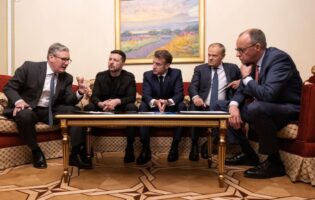NATO’s “Lost Nation”?
On November 20, 2013, AGI hosted a seminar with Tobias Bunde, DAAD/AGI Research Fellow, which dealt with Germany’s NATO policy. Mr. Bunde gave an overview of the increasing criticism of Germany by its allies, particularly concerning its contribution to multilateral operations involving the use of force. From the perspective of some observers, Germany has become the “new France” within NATO, opposing almost all initiatives aimed at reforming the Alliance while not coming up with its own proposals. Some have even referred to it as “NATO’s lost nation.”
Mr. Bunde described Germany’s stance on NATO as status-quo oriented, defined by its opposition to two visions for NATO that animated different camps within the Alliance and fundamentally shaped the Strategic Concept: a stronger commitment to territorial defense in Europe on the one hand, and NATO’s transformation into a globally connected security actor on the other hand. In contrast to earlier periods when German diplomacy played crucial roles in “re-inventing” NATO, the German government had not provided many ideas on how to adapt the Alliance to a changing security environment. Most strikingly, Germany had not lived up to its own call for making NATO the main forum for strategic debate for the transatlantic partners.
While the new coalition agreement did not provide much optimism for a reinvigorated NATO policy, Mr. Bunde maintained that the German foreign policy elite desired a more active German role in NATO—although this desire was not necessarily shared by the political leadership. In addition, recent developments within NATO actually meant that other allies had come closer to the German position on NATO, thus making it easier for the German government to re-engage with the Alliance.
Yet, he argued that it did not make sense for Germany’s allies to call for more defense spending since this was unlikely to happen anyway. Instead, its NATO partners should invoke Germany’s traditional commitment to a multilateral foreign policy, which might be the better way to prod Germany into taking a more active role within NATO. According to him, many foreign policy specialists in Germany had become quite critical of the increasing unilateral approach of the government, which had sometimes used the “culture of restraint” as an excuse for not participating in multilateral missions at all.
Please contact Mr. Parke Nicholson with any questions at pnicholson@aicgs.org.
| DATE: | Wednesday, November 20, 2013 |
| TIME: | 12:00pm – 1:30pm |
| LOCATION: | AGI |
| 1755 Massachusetts Ave., NW, Suite 700 |






